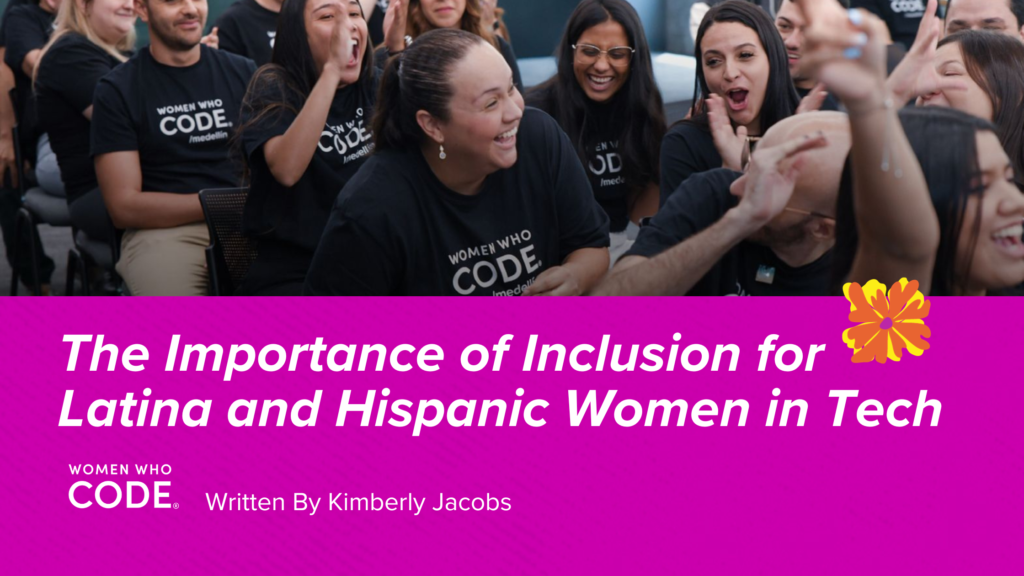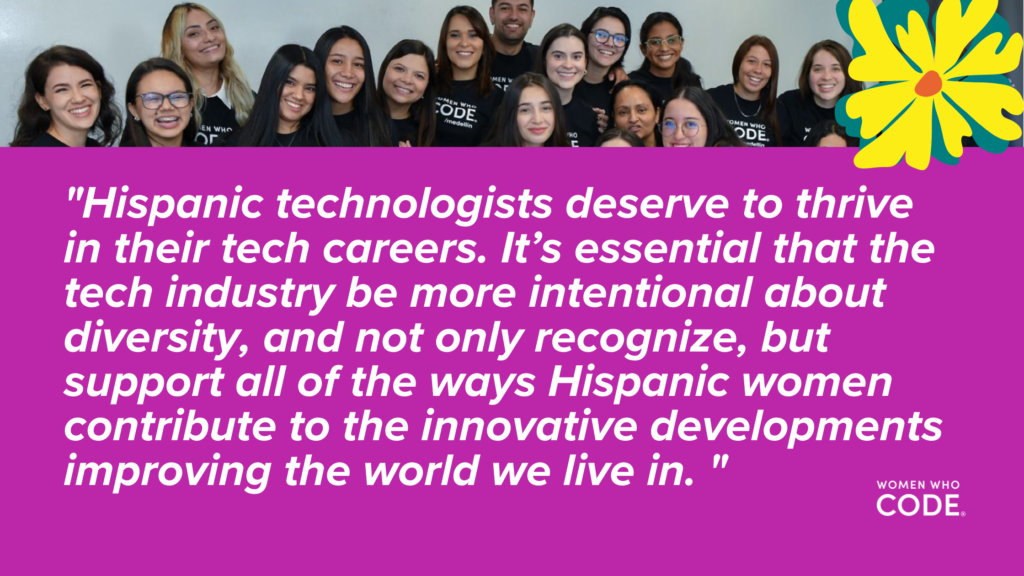The Importance of Inclusion for Latina and Hispanic Women in Tech
Written by Kimberly Jacobs

As the tech industry continues to evolve and new technologies emerge, increasing representation and visibility of Hispanic women is more important than ever. However, even with this urgent need for diverse perspectives, Hispanic and Latina technologists face systemic hurdles such as a lack of access to high-quality educational resources, pay inequality, and stereotypes and biases in hiring that continue to perpetuate the gender gap and overall underrepresentation within the industry with Hispanic women making up just 2% of the 26% of women in tech. Overcoming social and systemic hurdles is an ongoing struggle for all women looking to enter tech and can be significantly more difficult for Hispanic women, especially first-generation college students.
In 2021, Excelencia in Education reported that 44% of Hispanic students (including all genders) would most likely be the first in their family to attend college. In the U.S, Hispanic women and Latinas are typically both the first in their families to pursue higher education and work in corporate America. Many of whom become solely responsible for financing their own education. This often puts them at a financial disadvantage and hinders them from making career-accelerating social connections due to a lack of access to networking, conferences, and popular technical career events. This issue of systemic oppression often results in Hispanic women’s contributions and talent being overlooked in spite of their dedication to their work and community.
In addition to barriers to entry, Hispanic women and Latinas are navigating one of the most significant wage gaps in spite of negotiating their salaries and promotions at the same rate as other demographics. Latinas holding a Bachelor’s degree still experience a 31% pay gap on average. The wage gap can make career growth challenging when also considering the cost of living, especially in major tech hubs like Silicon Valley, Seattle, Boston, and New York City. According to the WWCode 2023 Equal Pay Survey, the impact of experiencing pay inequality has caused 42% of Latinx/Hispanic technologists to quit their technical role before the 10 year mark.

Embodying True Diversity
Hispanic technologists deserve to thrive in their tech careers. It’s essential that the tech industry be more intentional about diversity, and not only recognize, but support all of the ways Hispanic women contribute to advancing our digital world. Here are a few ways tech companies and departments can create more inclusive workplaces for Hispanic women:
- Increase exposure to the career possibilities in tech and foster interest in STEM/STEAM education.
- Improve hiring processes, including pay transparency and pay equality.
- Support career growth that leads to increased representation at the executive level, not just entry and management.
Despite challenges Hispanic women continue to make a lasting impact on the tech industry. As WWCode celebrates Hispanic Heritage Month in the U.S. from September 15 through October 15, we recognize their tremendous contributions, influence, and achievements in tech, past and present. Technologists like:
- Maria Teresa Arnal is an industrial engineer, former executive, founder, and entrepreneur whose career included working for Microsoft and Twitter in ad tech, which led to her being an executive for the LATAM market of Stripe and Google, among other companies, throughout her career.
- Angela Guzman is an entrepreneur and award-winning UX design lead responsible for co-designing the original set of Apple’s emojis in 2008, contributing to the concept, design, and development of iPhones, iPads, and Mac interfaces including the enhancements and maintenance of additional IOS products like Mail, Facetime, additional emoji sets, and more.
- Dr. Maria del Consuelo Jimenez is a professor at Universidad de Monterrey in the computation and industrial engineering department who created a program for teaching elementary school students coding in Nuevo Leon, Mexico City, and Venezuela.
- Soledad Antelada Toledano is the first female computer systems engineer and researcher in the cybersecurity division at Berkeley National Lab and is currently the Security Technical Program Manager at Google.
These are just a few women whose talent and tenacity have added tremendous value to the tech industry while paving the way for more Hispanic women to enter and excel. As the industry continues to evolve, we’re excited to see more Hispanic technologists emerge as leaders at every level.